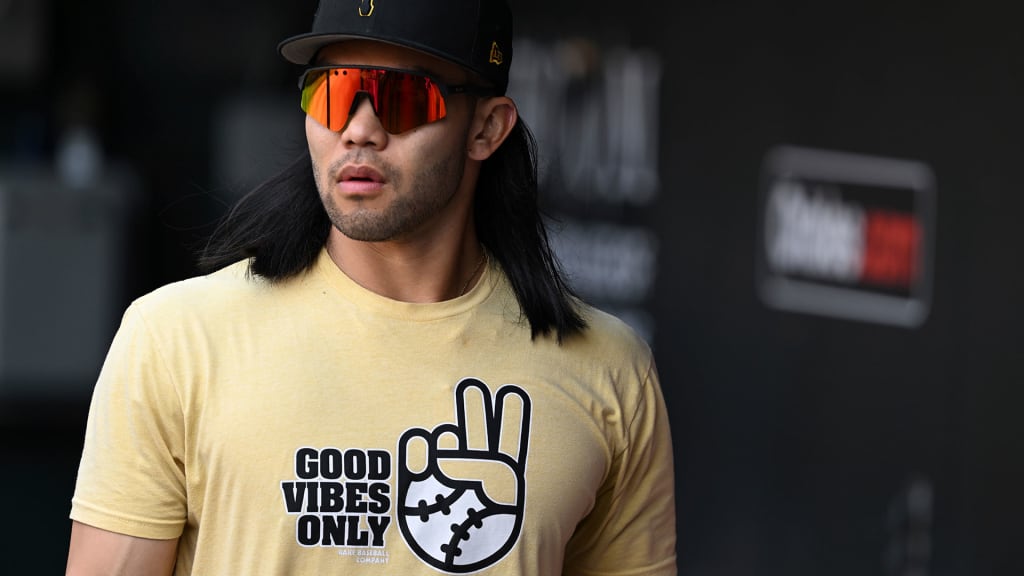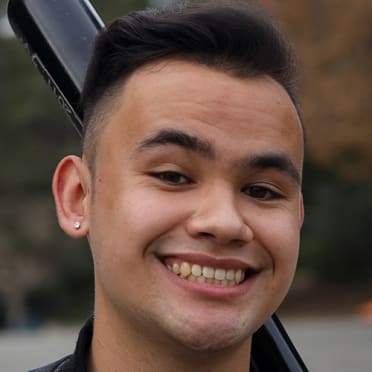Connor Joe didn’t initially realize the significance of what he had just done.
It was July 20, 2021. The Rockies called up Joe from Triple-A, and in his first game back with the ballclub, he was to start in left field and hit second. In his third plate appearance of the evening, Joe sent Marco Gonzales’ mistake fastball over the center-field fence and into Coors Field’s forest for his first career home run.
He glided around the bases. He gladly wore a smile upon receiving a hero’s welcome in the home dugout. Kylie, Joe’s wife, is typically a reserved observer, but couldn’t help but jump up and down while watching on her phone while back home in California.
Joe knew -- everyone knew -- that he had just hit his first career home run, a 441-foot no-doubter at that. Hitting his big fly was already reason enough to celebrate. As Joe jogged out to the outfield for the next half-inning, he realized the larger significance of what he had just done.
A year prior, exactly, Joe had beaten cancer.
“At the time that I played the game, I wasn't thinking that,” Joe said. “I knew it was my first home run in the big leagues -- that was enough to be excited about -- but the next half-inning, I went out to the outfield and I'm like, 'Oh my gosh. This is my one-year anniversary, too.' That was pretty incredible, the way God works and the way things happen for a reason.”
****
Joe wondered what was taking so long.
It was February of 2020. Joe was with the Dodgers in Spring Training as a non-roster invitee, his first time in big league camp. Before Joe could begin work, he underwent a standard physical.
The examination dragged on longer than anticipated, lasting roughly 45 minutes. The doctor felt something “odd” during the physical and recommended an ultrasound, which Joe received the following day. The sonographer who conducted the ultrasound wasn’t at liberty to discuss his findings, but did reveal to Joe that it likely wasn’t a cyst.
“This whole time, I have communication with my wife, but not with my family,” Joe said. “It’s anxious, man. Going home at night, being by myself in this apartment, being alone with so many thoughts running through my head. You think the worst, right? I do think of cancer, that sort of stuff.”
Joe remembers what unfolded next “like it was yesterday.” He and the Dodgers’ head medical director went to the Mayo Clinic where Joe endured an assortment of tests. At the end of the day, Joe was told that the results were consistent with testicular cancer.
Connor broke the news to Kylie as he drove back to his apartment. They both broke down over the phone. Joe pulled over to the side of the road at one point because the crying was so intense.
“It really caught us off guard,” Kylie said. “You never want someone you love to go through anything that difficult. It was really hard. It was a very emotional time.”
From the Mayo Clinic, Joe drove to the Dodgers’ Spring Training complex, where he broke the news to Andrew Friedman, the team’s president of baseball operations. Friedman told Joe that he had the full support of the team and to do what was best for himself.
Following his conversation with Friedman, Joe drove back to his apartment and packed his belongings. That night, Joe was geographically isolated from friends and family. Inside an emptied apartment, Joe was alone with his new reality.
“I think as people, we want certainty,” Joe said. “Not knowing was tough. So, my focus was to get home to my family, find doctors that I trusted and could treat me and go forward from there.”
Upon returning to California, Joe began treatment at UCLA Health in Los Angeles.
Joe underwent surgery to remove the tumor, and following the surgery, he underwent a full-body scan to determine if the cancer spread. That scan revealed that the cancer had metastasized to his left lung. Joe was subsequently prescribed four rounds of chemotherapy, each round being a week long, six hours per day.
“One of the [most significant] memories I have from the whole experience was the phone call saying that he would have to get chemo,” Kylie said. “That just broke me. My aunt was also going through stage four cancer. It was fresh in my mind how difficult it was, and to know that it would physically break him down was heartbreaking.”
Upon beginning chemotherapy, Joe commuted to Los Angeles from Orange County, an hour-and-a-half drive made slightly easier due to the lack of cars on the road during the COVID-19 pandemic. At the end of the second round, the side effects began to kick in. Joe lost his hair. He constantly felt nauseated, weak.
The treatments were, without question, difficult, but as an athlete, Joe knew how to follow a road map to recovery, even one as extreme as chemotherapy. He understood what his body could endure. What proved more difficult was knowing his family was seeing him in a diminished state.
“Some days towards the end of round three and round four, I couldn't get off the couch and I didn't feel good and I was throwing up,” Joe said. “As you see someone you love so much go through this and you can't help, I think that's harder. I realized that pretty early on.”
Even as he grinded through chemotherapy, Joe wasn’t content to remain on the couch. On days he felt capable, he found means to be active, from lifting to biking to kayaking. To Kylie, Joe’s willingness to move, even amid treatments, didn’t come as a surprise.
“We love to be outside. We love to be active,” Kylie said. “He did know it would give him energy and a breath of fresh air to get back in the gym, do things that he loves and get his mind off things.”
Following his final round of chemotherapy, Joe remained in a bit of limbo as he’d have to wait four to six weeks after his final infusion to determine if he was truly cancer-free. He kept himself occupied to the best of his ability, but his status continued to hover over him and his family.
On July 20, 2020, they’d have to worry no longer: Joe was cancer-free.
“It was pure joy, excitement, relief -- so much relief,” Kylie said. “I was so proud of him. He conquered so much in a short period of time. So much emotional stress. So much physical stress. He had to do all the key milestones by himself because it was COVID and we couldn’t be with him. It was so much alone time during a hard time. I’m so proud of him for overcoming all of that.”
It's common for Joe to wear clothing with a positive message, including a yellow T-shirt that reads, “Good Vibes Only” around the Pirates’ clubhouse prior to games. Given what he’s been through, what his family has been through, it’s hard to kill Joe’s vibe.
The experience served as a reality check; he never feared for his life, but the journey provided him with an understanding of life’s frailty. Joe was reminded of what’s most important. For him, that’s his family, his friends, his relationships. His relationship with Kylie is stronger. His relationship with his mother, Mee-Sun, and father, Peter, is stronger, something that he didn’t know was possible. Baseball is a significant part of his identity, but Joe has learned he is not defined as a man by his passion. Rather, he’s defined by his relationships, how he interacts with and treats others.
Joe isn’t immune to bad days -- he is only human. In having the game taken away from him, Joe has fallen in love with the game, and everything that comes with it, all over again.

He enjoys the games, the competition, but he enjoys the little things, the monotonous things, the unglamorous things, too. The stretches, the lifting, the defensive work. When Joe finds himself caught up in the grind of a season, he remembers when he was physically incapable of stretching, of lifting, of defending, of everything.
“It refreshed my perspective. It reminded me that this is a game,” Joe said. “We get to play a game for a living. You're running around with 25 other dudes trying to win a baseball game. It brought me back to the days of Little League and playing with your friends and nothing matters but winning … whether you're 0-for-4, but made some cool plays on the field or you're 4-for-4 and drove in six.
“It allowed me to see the joy of baseball again. I'm not sure how it would've turned out if I was never diagnosed with cancer, so that's another reason why I'm grateful for that journey, not only because of my relationships with my family and how that strengthened us, but my perspective on baseball and the joy that I find in it now.”
